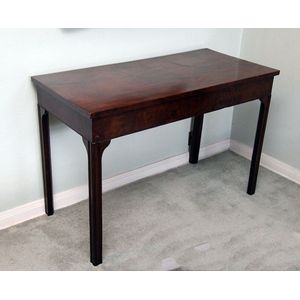Regency Mahogany Supper Table with Gate Opening
You must be a subscriber, and be logged in to view price and dealer details.
Subscribe Now to view actual auction price for this item
When you subscribe, you have the option of setting the currency in which to display prices to $Au, $US, $NZ or Stg.
- Provenance - A term used to describe the provable history of an antique or work of art, and thus an additional aid to verifying its authenticity. Provenance can have an inflating effect on the price of an item, particularly if the provenance relates to the early settlement of Australia, a famous person, or royalty. Less significant are previous sales of the item through an auction house or dealer.
- Fluting - A form of decoration found on many pieces of furniture, as well as ceramics, silver and clocks, in which round-bottomed grooves, of varying width and depth, are let into columns, pilasters, legs. As a general rule, flutes are cut in the vertical, though they may follow a turned leg in a spiral pattern. In cross-section, they may be described as a series of 'U' shapes, rising and narrowing at each end of the groove. Fluting is the opposite of reeding, with which fluting is often associated.
- Mahogany - Mahogany is a dense, close grained red-coloured timber from the West Indies and Central America. It was first imported into Europe in the the early 18th century and its use continued through the 19th century. It was popular for furniture making because of its strength, the wide boards available, the distinctive grain on some boards, termed flame mahogany and the rich warm colour of the timber when it was polished.. The "flame" was produced where a limb grew out from the trunk of the tree, and this timber was usually sliced into veneers for feature panels on doors, backs and cornices.
Some terms used to describe mahogany relate to the country from which it originally came, such as "Cuban" mahogany, "Honduras" mahogany etc. However unless the wood has been tested the names assigned are more a selling feature, rather than a true indication of the timber's origin. - Regency Period - The Regency period in English furniture design refers to the period when King George III, was declared unfit to rule in 1811, and his son ruled as proxy as Prince Regent, until 1820, and then, after the death of his father as George IV until his death in 1830. The Regency period was preceded by the Georgian period (George I, George II, and George III: 1714 - 1811), and was followed by the William IV period, which only lasted until 1837 when William IV died as was succeeded by Queen Victoria.
This item has been included into following indexes:
Visually similar items

A George III mahogany pembroke table. Hinged sides, with end drawer to on square tapering supports. 70 cm high, 82.5 cm wide (open), 70 deep.

A modernist teak side table of square form on tapering legs, 70 cm wide, 53 cm high. Purchased in the late 1950s. The Estate of Stanley Crawford Stevens.

A George III mahogany dining table with central gate section and D ends. Provenance: Wilson's Antiques formerly of Bourke Road Hawthorn. 72 cm high, 288 cm long, 118 cm wide.

A George III mahogany serving table, circa 1780, of rectangular form on square chamfered legs.
